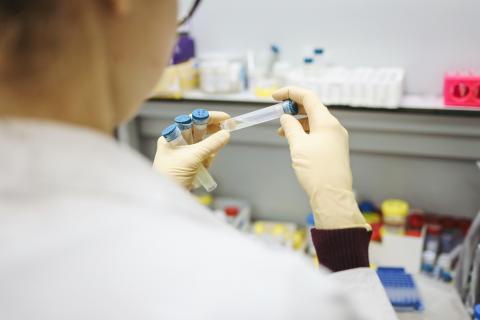
A new study from CIDRAP warns that the COVID-19 pandemic could last for two years, the time it may take for 60 to 70 percent of the population to become immune. A vaccine could shorten this timeline, minimizing the health and economic impacts of the disease. However, developing a vaccine quickly comes with its own risks, and the biotech companies and healthcare organizations involved in creating and testing a vaccine will need to navigate these challenges carefully.
Operation Warp Speed
Normally, the development of a vaccine is a lengthy process. However, in the case of COVID-19, the pressure is on for speedy results.
According to Kaiser Health News, the Trump Administration is calling for Operation Warp Speed, a program that unites government agencies, the military and private pharmaceutical companies to reduce the time needed to develop a vaccine. Although there are obvious reasons to want this, officials have expressed concern that rushing the vaccine could decrease its safety and effectiveness.
Meanwhile, some researchers are considering risky methods in the quest for a cure. According to STAT, some scientists want to pursue human infection trials, in which volunteers are purposefully infected in a controlled setting. An application to conduct human infection trials for Zika was rejected by an ethics panel in 2017. Now the idea is being debated again, but some say the option is too risky without proven ways to treat severe cases of COVID-19.
Safety of Workers and Participants
Amid the risks and debates, biotech companies and healthcare organizations are working toward a vaccine. As they carry out clinical trials, they must consider multiple health and safety threats to both their workers and the trial participants.
International travel is currently restricted, and this may create barriers for biotech companies. A Level 3 Travel Health Notice, which indicates widespread transmission with restrictions on entry to the United States, has been put in place for China, Iran, the United Kingdom, Ireland and most European countries.
Shelter-in-place orders may add more complications. Although essential work is typically allowed to continue under state orders, the threat of infection remains. If an outbreak occurs in a lab or healthcare facility, both the workers and participants could be put at risk.
Social distancing and the use of personal protective equipment (PPE) can help prevent infection. However, social distancing may be difficult in some work scenarios, and widespread shortages have made it challenging to obtain sufficient PPE. According to the CDC, healthcare facilities should use PPE contingency strategies and may need to consider more extreme crisis capacity strategies until supplies increase and standard practices can resume. For example, organizations may need to use PPE that has passed the manufacturer-designated shelf life or prioritize PPE use for selected care activities.
PPE shortages could put participants at risk of infection, and restrictions put in place to minimize infection could make it difficult to deliver care and monitor patients.
Despite the risks, many people are willing to volunteer. According to WHAM, hundreds of people volunteered for a Rochester Clinical Research trial within a 24-hour period.
Regulatory and Insurance Implications
Many factors may make it difficult or impossible to follow normal procedures for clinical trials:
- The need to practice social distancing, self-isolation, and quarantine
- The push for fast results
- Travel restrictions, stay-at-home orders, and site closures
- Personal protective equipment shortages and other supply chain disruptions
Despite these challenges, biotech companies and healthcare organizations still have to follow regulations. Some guidelines may be eased, and new procedures may be approved, but safety is still a concern.
At the same time, organizations must consider insurance implications. If something goes wrong and participants are harmed, a lawsuit could result. Clinical trial liability insurance can provide coverage. However, these policies may list exclusions and other restrictions. Even under normal circumstances, Clinical Trial Insurance is specialized. Managing clinical trial risk under the COVID-19 environment creates unprecedented situations and risks.
If your company is involved in any part of clinical trials for COVID-19, either as a sponsor, CRO or Site, it’s essential that you contact your broker to review coverage. You should verify and understand potential insurance gaps and how to mitigate potential exposures before you begin COVID-19 clinical trials.
While you’re working to safeguard human lives, take a few steps to also protect your company’s future. Small adjustments in your insurance coverage or processes could make a big difference in future liability exposures.
- Log in to post comments
